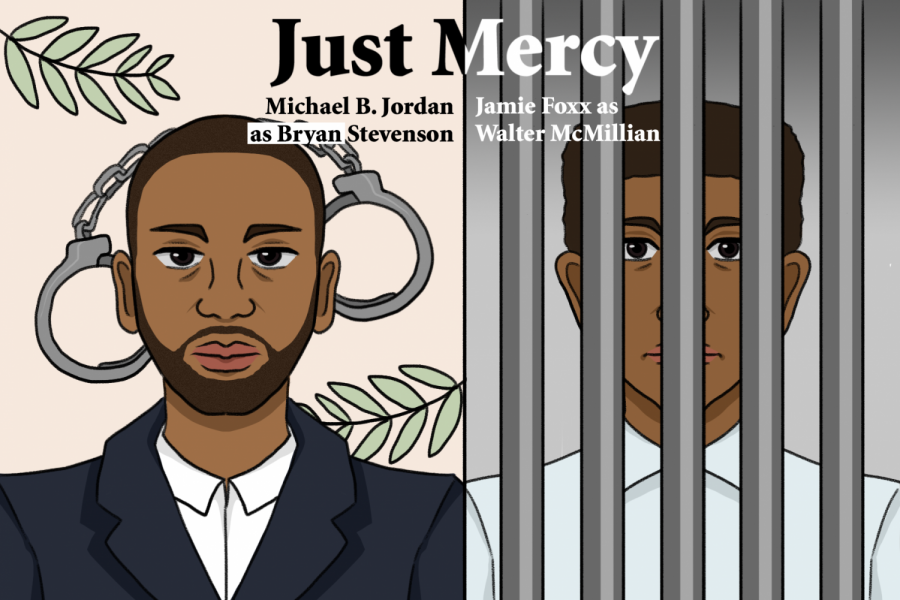Just Mercy exposes prison system bias, evokes raw emotion
Law movie Just Mercy, based on the bestselling book, came out this January. The plot follows defense attorney Bryan Stevenson (played by Michael B. Jordan) as he tackles a case centering around Walter McMillian (played by Jamie Foxx), who was wrongly convicted of murder.
April 27, 2020
Warning: the following includes spoilers. Read at your own discretion.
In 1988, an Alabama man named Walter McMillian was wrongly convicted of the murder of a white 18 year old, Ronda Morrison, and consequently sentenced to death. The only evidence against him was testimony from a prisoner and a young man, both of whom were coerced by the police.
More than 30 years later, the movie Just Mercy portrays the struggles of death row lawyer Bryan Stevenson’s (played by Michael B. Jordan) journey in proving McMillian, also known as Johnny D, (played by Jamie Foxx) innocent.
Throughout the film, I was able to see his struggles as a black lawyer in the South. It made me feel as if I was going through the process with him.
As Stevenson reviews Johnny D’s case, he notices how bare it is; there are only two witnesses. The main evidence against him is from a lifelong convict, Ralph Myers ( Tim Blake Nelson), who claims he was held by Johnny D at gunpoint at the crime scene even though he was in prison at the time.
DNA analysis only became a crucial part of evidence during the mid 1990s.Previously, word of mouth could have the same impact as a DNA test, making the only evidence against Johnny D a faulty testimony, reinforcing the bias within the justice system.
In the film’s second half, Stevenson focuses on Myers. At first, Myers refuses to cooperate. However later, Stevenson digs out audiotapes of Myers’ original statement, where Myers refused to testify against an innocent man.
Stevenson finds out that Myers was transferred to death row unless he falsely confessed. With this evidence, Stevenson gets Johnny D a new trial.
To see the police threaten Myers with death row for not complying with the police is appalling. It is unethical to force an innocent man to falsely plead guilty. But Just Mercy shows that it is possible, given the corruption of the justice system.
At the retrial Stevenson calls neighbors, a police officer that was asked to lie against Johnny D, and finally Myers himself.
Myers is hesitant at first, but later admits that Johnny D is an innocent man and that he was threatened by the police to lie or get sentenced to death row. Even with the overwhelming evidence, the local court refuses to grant a retrial.
Hearing this made me very upset, even though Stevenson presented an overwhelming amount of evidence that proves how Johnny D was not the murderer, the court still did not approve. I felt the same emotions as Stevenson, angry at the focus on skin color rather than justice. It made me realize how we, as a society, need to still improve and that the fight to equality is far from over.
At the end, Johnny D is finally released as the state court takes account of Stevenson’s argument and his strong case about justice and fairness.
I found myself in tears seeing how difficult it was to prove a man’s innocence and the hardships it brought frustrated me.
Jordan’s and Foxx’s performances fueled raw emotions and frustration within me. It shows how access to justice is more critical than ever.
The consequences of an inadequate legal representation could be a factor of life or death.
Overall, Just Mercy is a compelling movie that exposes the corruption of the prison system. It threw me into a whirl of emotions and had me at the edge of my seat. The fact that this is based off of a true story from not that long ago shows how racism is still prevalent in the justice system.
Follow Nanette Pottoore (@nanettepottoore) and @CHSCampusNews











